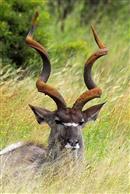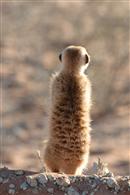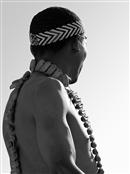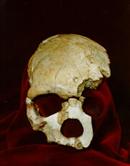 A schematic representation of riparian vegetation types. Source:NTEAP 2007 ( click to enlarge ) |
 Water Hyacinth. Source:Nile RAK 2007 ( click to enlarge ) |
 Trichoptera Caddisfly pupae are found in lakes, rivers and streams. Source:Martin 2005 ( click to enlarge ) |
 Orange River Mud Fish Source:Inkwazi Fly Fishing 2009 ( click to enlarge ) |
 Water Monitor Lizard. Source:De Wet 2006 ( click to enlarge ) |
 Crocodile. Source:Hatfield 2009 ( click to enlarge ) |
 Dam management practices have a significant influence on stream flow in the basin. Source:Pyke 2001 ( click to enlarge ) |
 Fanana Sponge in Lesotho. Source:Lesotho Water Commission 2003 ( click to enlarge ) |
 A wetland on the Motete River, Lesotho. Source:Lesotho Water Commission 2008 ( click to enlarge ) |
 Spiral Aloe. Source:Brew 2006 ( click to enlarge ) |
 The Orange-Senqu River basin has numerous species of large mammals, including Kudu. Source:Meintjes 2007 ( click to enlarge ) |
 Hartlaub Gulls are endemic to the Atlantic coastline of South Africa and Namibia. Source:MBoy68 2007 ( click to enlarge ) |
 Invasive reeds in the Fish River downstream of Hardap Dam. Source:DRFN 2004 ( click to enlarge ) |
 A Meerkat in Kgalagadi game reserve. Source:MisterE 2009 ( click to enlarge ) |
 Terrestrial Biomes of the Orange-Senqu River basin. Source:Hatfield 2009, after WWF 2004 ( click to enlarge ) |
 Protection of biodiversity is important at a range of scales. Source:©iStockphoto/Pukema 2008 ( click to enlarge ) |
 Water is a vital natural resource that needs to be protected. Source:DRFN 2004 ( click to enlarge ) |
 The San of the Kalahari are one of the indigenous groups of the Orange-Senqu River basin. Source:AddictivePicasso 2008 ( click to enlarge ) |
 A member of the San people in traditional costume. Source:© iStockphoto/Parnell 2006 ( click to enlarge ) |
 The Florisbad Skull. Source:National Museum, Bloemfontein ( click to enlarge ) |